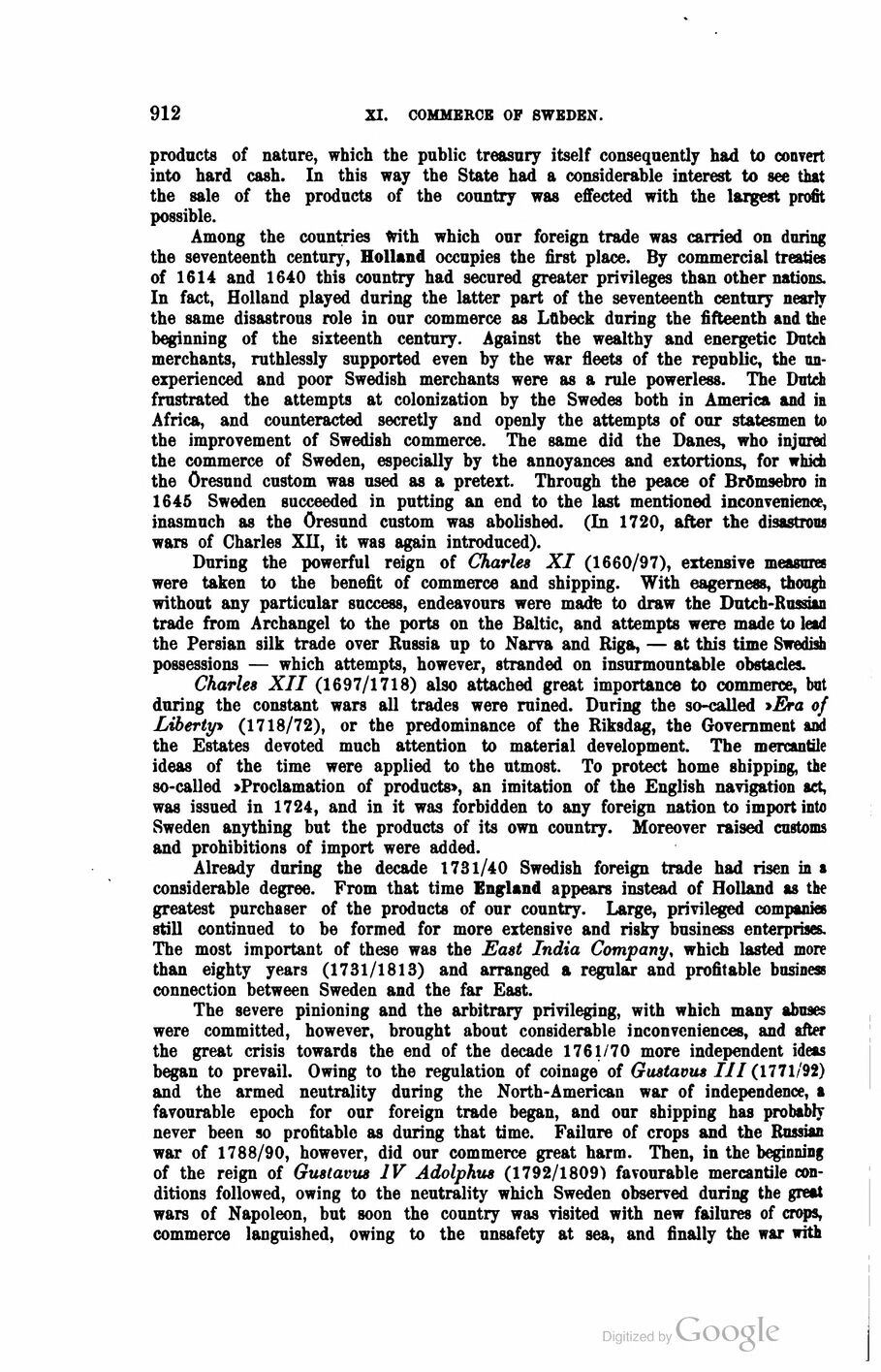
Full resolution (JPEG) - On this page / på denna sida - Second part - XI. Commerce - History

<< prev. page << föreg. sida << >> nästa sida >> next page >>
Below is the raw OCR text
from the above scanned image.
Do you see an error? Proofread the page now!
Här nedan syns maskintolkade texten från faksimilbilden ovan.
Ser du något fel? Korrekturläs sidan nu!
This page has never been proofread. / Denna sida har aldrig korrekturlästs.
912
XI. COMMERCE! OF SWEDEN.
products of nature, which the public treasury itself consequently had to convert
into hard cash. In this way the State had a considerable interest to see that
the sale of the products of the country was effected with the largest profit
possible.
Among the countries With which our foreign trade was carried on during
the seventeenth century, Holland occupies the first place. By commercial treaties
of 1614 and 1640 this country had secured greater privileges than other nations.
In fact, Holland played during the latter part of the seventeenth century nearly
the same disastrous role in our commerce as Lflbeck during the fifteenth and the
beginning of the sixteenth century. Against the wealthy and energetic Dutch
merchants, ruthlessly supported even by the war fleets of the republic, the
unexperienced and poor Swedish merchants were as a rule powerless. The Dutch
frustrated the attempts at colonization by the Swedes both in America and in
Africa, and counteracted secretly and openly the attempts of our statesmen to
the improvement of Swedish commerce. The same did the Danes, who injured
the commerce of Sweden, especially by the annoyances and extortions, for which
the Öresund custom was used as a pretext. Through the peace of Brömsebro in
1645 Sweden succeeded in putting an end to the last mentioned inconvenience,
inasmuch as the Öresund custom was abolished. (In 1720, after the disastrous
wars of Charles XII, it was again introduced).
During the powerful reign of Charles XI (1660/97), extensive measures
were taken to the benefit of commerce and shipping. With eagerness, though
without any particular success, endeavours were made to draw the Dutch-Russian
trade from Archangel to the ports on the Baltic, and attempts were made to lead
the Persian silk trade over Russia up to Narva and Riga, — at this time Swedish
possessions — which attempts, however, stranded on insurmountable obstacles.
Charles XII (1697/1718) also attached great importance to commerce, bot
during the constant wars all trades were ruined. During the so-called »Era of
Liberty» (1718/72), or the predominance of the Riksdag, the Government and
the Estates devoted much attention to material development. The mercantile
ideas of the time were applied to the utmost. To protect home shipping, the
so-called »Proclamation of products», an imitation of the English navigation act,
was issued in 1724, and in it was forbidden to any foreign nation to import into
Sweden anything but the products of its own country. Moreover raised customs
and prohibitions of import were added.
Already during the decade 1731/40 Swedish foreign trade had risen is »
considerable degree. From that time England appears instead of Holland as the
greatest purchaser of the products of our country. Large, privileged companies
still continued to be formed for more extensive and risky business enterprises.
The most important of these was the East India Company, which lasted more
than eighty years (1731/1813) and arranged a regular and profitable business
connection between Sweden and the far East.
The severe pinioning and the arbitrary privileging, with which many abuses
were committed, however, brought about considerable inconveniences, and after
the great crisis towards the end of the decade 1761/70 more independent ideas
began to prevail. Owing to the regulation of coinage of Gustavus III (1771/92)
and the armed neutrality during the North-American war of independence, a
favourable epoch for our foreign trade began, and our shipping has probably
never been so profitable as during that time. Failure of crops and the Russian
war of 1788/90, however, did our commerce great harm. Then, in the beginning
of the reign of Gustavus IV Adolphus (1792/1809) favourable mercantile
conditions followed, owing to the neutrality which Sweden observed during the great
wars of Napoleon, but soon the country was visited with new failures of crops,
commerce languished, owing to the unsafety at sea, and finally the war with
<< prev. page << föreg. sida << >> nästa sida >> next page >>